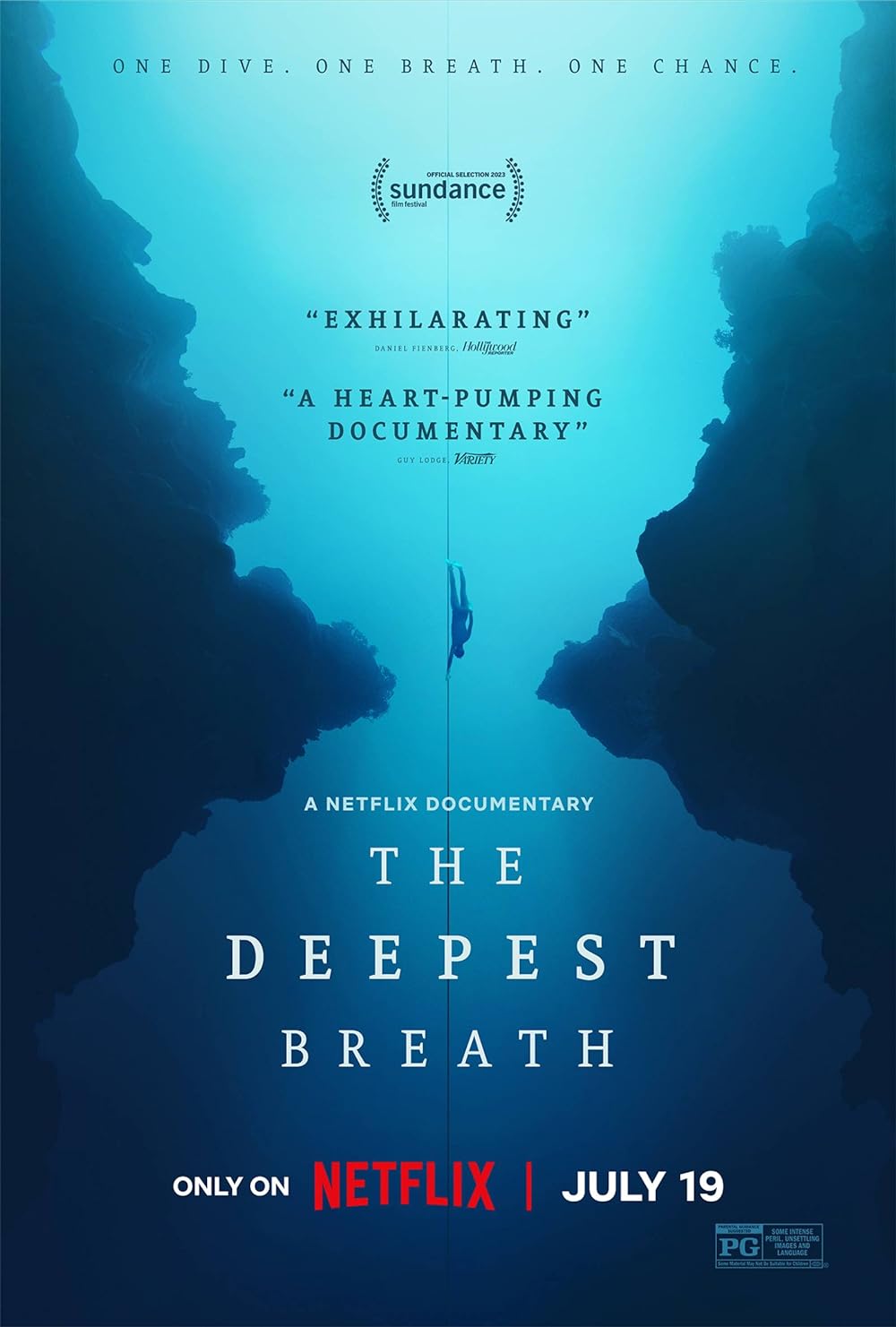

Breathtaking. Literally and figuratively, that is how – ironically – The Deepest Breath can be best described. Following the free divers Alessia Zecchini and Steven Keenan on their journey to and within the extreme sport, this documentary captivates, fascinates, and unsettles from the beginning. We see Alessia floating in the water, nose clip on in order to keep the water out, with a little floatie keeping her head over water as the judges count down from five. Full focus and the right breathing technique is crucial right now to be prepared for what is about to come: She will dive down deep into the ocean in a straight line along a rope (and obviously back up again), all on a single breath and without an oxygen tank. ‘Alessia Zecchini. Italy. Four minutes. World Record attempt.’ It is time. Alessia takes one last breath before going into the water. The nearly four-minute-long starting sequence showing her whole free dive seems lengthy at first, but the longer it goes on, the more you yourself become uncomfortable and tense. Watching her struggle during those last meters, asking yourself when and if she is finally going to resurface. Surely, all this cannot be done as a human being in just one single breath? But it is, and this film takes us on a journey into the world of this extreme sport and its athletes.
Even though Alessia and Stephen found their purpose in the sport in different ways, from the interviews with friends and family it becomes clear that this is not just a sport to them, it is their passion and their life. Often at the dismay and worry of colleagues and friends, they dedicate everything into pushing themselves to the furthest, going deeper and harder, and testing the limits of their body repeatedly, which is simultaneously admirable and terrifying to watch. The film does a good job depicting the extremeness of the sport, covering deaths, accidents as well as successful dives of the community.
At some point we hear Alessia say ‘Everybody must have a dream and put all their effort in; and really, everything is possible’. And while that seems like quite a basic quote that could come from any professional athlete, one cannot stop but be taken aback by the absolute insanity that this sport can be. When looking through other reviews of the film, there were quite a few comments saying something to the effect of ‘good movie, but sorry, this is such a stupid sport’. To be very honest, it is hard to argue against them. After about 30 meters into the dive, the pressure starts to push the diver down, putting them in a kind of ‘free fall’. For Alessia, this is the best part as it feels like flying and ‘it is like being on the last quiet place on the earth’. At a certain depth (which the athlete has determined beforehand), they turn around and go the whole way back up. So, after being pulled down to those tremendous depths, this is where the real work begins. The diver is not just in a free fall anymore, they have to ‘break that meditation’ and actively swim back up to the surface. That, of course, increases their heart rate and strains their lungs- which are, by now, compressed to the size of a human fist because of all the pressure. Now it becomes clear why 99% of all accidents happen within the last 10 meters: you push yourself more and more to reach the surface but sometimes, your mental capacities just outdo your physical ones. Sometimes that may result in a ‘blackout’, where the brain turns itself off and you lose consciousness. At that point, you have about 1-2 minutes left before brain damage occurs. This becomes awfully real when you see the footage of that (not uncommon!) event. Seeing the divers’ faces floating in the water lifeless and blue makes you ask yourself: To what lengths should people go to to follow their passion? How far can and should humans push their body, how extreme is too extreme?
The Deepest Breath is the kind of film that you can’t turn away from but want to be over with at the same time. It gives us insight into a world full of passion, drive and a little bit of insanity. All the interviews, the beautiful ocean shots and the vivid diving footage give you that certain eerie feeling where you just know something bad is about to happen. The film increases in suspense towards its tragic climax in the end, where you find yourself glued to your chair, eyes wide open and holding your own breath, hoping that it may help them prolong theirs.
Director: Laura McGann
The Deepest Breath is currently available on Netflix.

Breathtaking. Literally and figuratively, that is how – ironically – The Deepest Breath can be best described. Following the free divers Alessia Zecchini and Steven Keenan on their journey to and within the extreme sport, this documentary captivates, fascinates, and unsettles from the beginning. We see Alessia floating in the water, nose clip on in order to keep the water out, with a little floatie keeping her head over water as the judges count down from five. Full focus and the right breathing technique is crucial right now to be prepared for what is about to come: She will dive down deep into the ocean in a straight line along a rope (and obviously back up again), all on a single breath and without an oxygen tank. ‘Alessia Zecchini. Italy. Four minutes. World Record attempt.’ It is time. Alessia takes one last breath before going into the water. The nearly four-minute-long starting sequence showing her whole free dive seems lengthy at first, but the longer it goes on, the more you yourself become uncomfortable and tense. Watching her struggle during those last meters, asking yourself when and if she is finally going to resurface. Surely, all this cannot be done as a human being in just one single breath? But it is, and this film takes us on a journey into the world of this extreme sport and its athletes.
Even though Alessia and Stephen found their purpose in the sport in different ways, from the interviews with friends and family it becomes clear that this is not just a sport to them, it is their passion and their life. Often at the dismay and worry of colleagues and friends, they dedicate everything into pushing themselves to the furthest, going deeper and harder, and testing the limits of their body repeatedly, which is simultaneously admirable and terrifying to watch. The film does a good job depicting the extremeness of the sport, covering deaths, accidents as well as successful dives of the community.
At some point we hear Alessia say ‘Everybody must have a dream and put all their effort in; and really, everything is possible’. And while that seems like quite a basic quote that could come from any professional athlete, one cannot stop but be taken aback by the absolute insanity that this sport can be. When looking through other reviews of the film, there were quite a few comments saying something to the effect of ‘good movie, but sorry, this is such a stupid sport’. To be very honest, it is hard to argue against them. After about 30 meters into the dive, the pressure starts to push the diver down, putting them in a kind of ‘free fall’. For Alessia, this is the best part as it feels like flying and ‘it is like being on the last quiet place on the earth’. At a certain depth (which the athlete has determined beforehand), they turn around and go the whole way back up. So, after being pulled down to those tremendous depths, this is where the real work begins. The diver is not just in a free fall anymore, they have to ‘break that meditation’ and actively swim back up to the surface. That, of course, increases their heart rate and strains their lungs- which are, by now, compressed to the size of a human fist because of all the pressure. Now it becomes clear why 99% of all accidents happen within the last 10 meters: you push yourself more and more to reach the surface but sometimes, your mental capacities just outdo your physical ones. Sometimes that may result in a ‘blackout’, where the brain turns itself off and you lose consciousness. At that point, you have about 1-2 minutes left before brain damage occurs. This becomes awfully real when you see the footage of that (not uncommon!) event. Seeing the divers’ faces floating in the water lifeless and blue makes you ask yourself: To what lengths should people go to to follow their passion? How far can and should humans push their body, how extreme is too extreme?
The Deepest Breath is the kind of film that you can’t turn away from but want to be over with at the same time. It gives us insight into a world full of passion, drive and a little bit of insanity. All the interviews, the beautiful ocean shots and the vivid diving footage give you that certain eerie feeling where you just know something bad is about to happen. The film increases in suspense towards its tragic climax in the end, where you find yourself glued to your chair, eyes wide open and holding your own breath, hoping that it may help them prolong theirs.
Director: Laura McGann
The Deepest Breath is currently available on Netflix.



